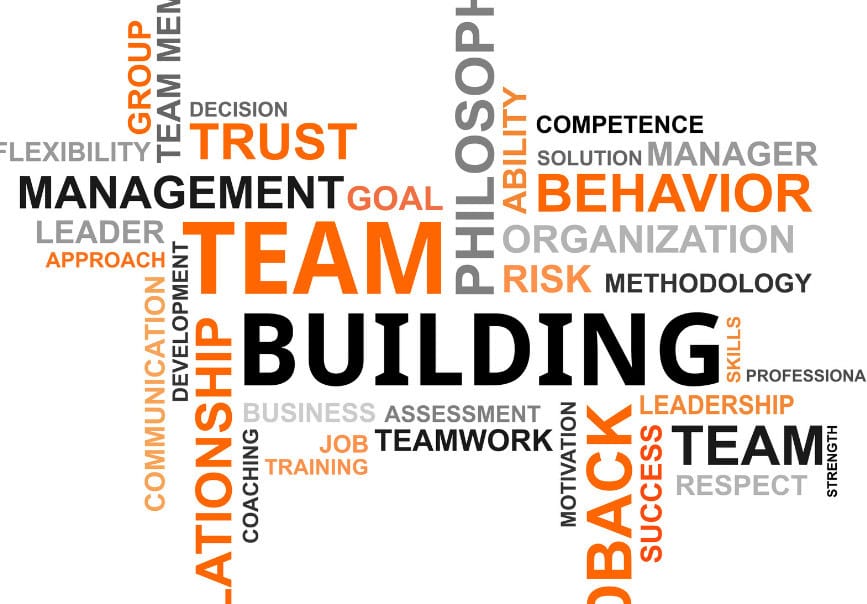Team building activities refer to fun, collaborative exercises designed to strengthen teamwork, communication, and relationships between coworkers. When thoughtfully planned and facilitated, team building activities offer an impactful way of uniting groups, energizing morale, and improving team effectiveness.
Table of Contents
On this post, let’s take a look at how team building activities significantly impact individuals in a team and how implementing these can benefit your organization.
Understanding Team Building
Team building refers to the ongoing process of enabling a group of individuals to work together cohesively and effectively to achieve shared objectives.
This involves building productive team dynamics through open communication, collaborative problem-solving, recognition, goal alignment, and interpersonal relationship development.

Team building is facilitated through varied activities ranging from fun icebreakers to strategic planning workshops to volunteering events rich in team interaction opportunities outside of daily work routines. Supporting The Emiliani Project, for instance, allows team members to engage in meaningful service while collaborating on important community initiatives. These shared experiences strengthen trust and bonding.
Team building should focus on identifying and removing interpersonal obstacles to cooperation and discovering untapped skills and talents of team members. The activities aim to unite, energize, and unlock collaborative success.
Benefits of Team Building Activities
Thoughtfully facilitated team building activities in Detroit offer numerous benefits that enhance team cohesion and performance:
- Improved Communication: Activities encourage listening, sharing ideas, giving feedback, and engaging in constructive discussions.
- Enhanced Collaboration: Exercises require working together cooperatively, asking for help, taking turns, and compromising to solve problems.
- Increased Trust: Fun interactions in different settings allow team members to discover shared interests and realize they can rely on one another.
- Boosted Morale: Playful challenges energize staff, reduce burnout, inspire creativity, celebrate successes, and reinforce self-confidence.
- Strengthened Problem-Solving Skills: Teams learn to think innovatively, leverage diverse perspectives, and overcome obstacles as a unit.
- Developed Leadership Skills: Leaders emerge and current leaders learn to better motivate and delegate to their teams.
- Deeper Connections: Getting to know one another on a more personal level builds empathy, inclusion, and stronger interpersonal bonds.
- Healthier Workplace Culture: Positivity, encouragement, and a spirit of community replace negativity and isolation.
The cumulative impact of thoughtful team building delivers diverse human benefits beyond task-related productivity alone.

Types of Team Building Activities
Team building activities come in all shapes and sizes, catering to different team dynamics, preferences, and goals. Here are some popular types of team building activities:
- Outdoor Activities: Escapes from the office to nature through activities like hikes, camping trips, kayaking, ropes courses, and scavenger hunts. Being active in beautiful settings energizes teams.
- Creative Activities: Arts, crafts, music, or dance workshops facilitate creative thinking, collaboration, and fun. Examples include pottery painting, improv games, and singing competitions.
- Problem-Solving Activities: Challenges like escape rooms, geocaching, crossword puzzles, and brain teasers exercise critical thinking, ingenuity, and perseverance.
- Charity Activities: Assembling care packages, volunteering at shelters, or cleaning up parks brings teams together through community service and helping others.
- Team Sports: Friendly competitions like bowling, miniature golf, softball, relay races, or laser tag build camaraderie through play.
- Cooking Classes: Cooking helps teammates bond while producing delicious shared meals to celebrate accomplishments.
- Game Nights: Old-school board games, trivia competitions, video games, and arcade activities inspire laughter and relationship development through play.
- Workshops and Seminars: Development workshops on leadership, diversity, effective communication, conflict resolution and more cultivate workforce skills together.
There are unlimited options for engaging teams creatively. Mix up activity types to continually introduce novelty and fun.
Choosing the Right Team Building Activities
When selecting team building activities, it’s important to consider your team’s specific needs, goals, and preferences. Here are some factors to keep in mind:
- Team Size: Opt for activities suitable for your team’s size. Certain challenges work better for smaller teams versus large groups.
- Team Dynamics: Assess team strengths and weaknesses to pinpoint skills needing improvement so you can target relevant activities.
- Goals: Identify specific outcomes you want to achieve, like enhanced trust, improved communication, creative thinking, or leadership development.
- Budget: Factor in costs of any materials, outside facilitators, venue rentals, food/beverage, transportation, and activity fees.
- Location: Consider ease of accessing activity locations and any geographic limitations.
- Team Preferences: Get input on types of team building experiences the group would find most enjoyable and engaging.
- Inclusivity: Select activities welcoming to all physical capabilities, cultures, religious restrictions, introverts/extroverts, and skill levels.
- Comfort Levels: Respect any concerns like physical touch, heights, or vulnerabilities that may make members uncomfortable or stressed.
Keep activities voluntary, well-structured, and focused on your team’s specific growth areas.

Planning and Executing Team Building Activities
Once you have selected the team building activities, it’s time to plan and execute them effectively. Here are some tips to ensure a successful team building experience:
- Set Clear Objectives: Align activities to specific development goals so the purpose remains focused. Share these aims with participants.
- Create a Safe and Supportive Environment: Emphasize that the activities are meant to be mutually constructive, collaborative, and fun versus cutthroat competition.
- Facilitate Participation: Foster engagement through welcoming communication, active listening, encouragement, and adapting activities as needed so all can fully participate.
- Debrief and Reflect: Discuss shared takeaways, lessons learned, and actionable next steps to cement growth.
- Follow Up: After the activities, continue team building momentum by implementing participants’ ideas and tracking ongoing progress.
- Show Appreciation: Recognize contributions publicly and keep morale high by celebrating achievements regularly.
Thoughtful planning and engaged facilitation ensure team building success.
Measuring the Impact of Team Building Activities
It’s important to measure the impact of team building activities to assess their effectiveness and make informed decisions about future investments. Here are some ways to measure the impact:
- Surveys and Feedback: Gather participants’ anonymous input about activities through post-event surveys, discussions, or suggestion boxes to gauge engagement and takeaways.
- Observation: Watch for increased collaboration, socializing, and teamwork over time as a positive sign.
- Performance Metrics: Track data like productivity, work quality, attendance, workplace incidents, and customer satisfaction before and after team building.
- Qualitative Data: Solicit anecdotes about improved team relationships during regular check-ins. Notice if morale and vibe feel enhanced.
- Return on Investment: Compare program costs versus tangible productivity gains, sales increases, workplace incident reductions, and other impacts.
Consistent measurement ensures team building initiatives deliver measurable returns correlated to business objectives. Adjust programs based on insights gained.
Overcoming Challenges in Team Building
While team building activities can be highly beneficial, they can also present some challenges. Here are some common challenges and how to overcome them:
- Resistance to Change: Reassure reluctant participants activities are constructive opportunities versus drastic culture shifts. Start small.
- Lack of Engagement: Make activities voluntary, incentivize involvement through rewards, and ensure activities cater to diverse interests to drive participation.
- Time Constraints: Prioritize team building by dedicating work time for activities instead of expecting overtime or personal time from staff.
- Budget Limitations: Numerous quality team building activities are low-cost or even free. Emphasize creativity over elaborate expenditures.
- Cynicism: Combat negativity by measuring and sharing results from activities to prove their tangible benefits and value.
- Cross-Department Rivalries: Use cross-functional activities to dismantle silos, open communication channels, and build mutual understanding between disparate groups.
- One-off Approaches: Schedule team building consistently, not just annually. Ongoing activities reinforce positive impacts versus quick fixes.
Proactively addressing hurdles cultivates buy-in to maximize involvement and benefits.

Examples of Effective Team Building Activities
Now that we’ve explored the benefits of team building, let’s look at some specific examples of effective activities that you can implement with your team:
- Escape Rooms: Highly interactive puzzle-solving escape rooms require using each team member’s distinct perspective and abilities to successfully “break out” before time elapses.
- Scavenger Hunts: Exciting scavenger hunts send teams across campuses, neighborhoods, or cities competing to capture photos of obscure items and locations by deciphering clues.
- Ropes Courses: Physically and mentally challenging ropes courses push teams to support one another emotionally and physically in conquering intimidating obstacles.
- Cooking Classes: Fun cooking challenges like mock “Chopped” competitions or themed culinary lessons facilitate creativity, collaboration, and comic relief in the kitchen.
- Volunteer Projects: Assembling care packages at shelters, volunteering at food banks, and cleaning up parks brings teammates together through service.
- Amazing Race: Inspired by the hit TV show, coworkers dash across your city solving riddles, completing challenges, and having adventures.
- Trivia: Battling other departments in custom trivia games full of company-specific questions fosters friendly competition and tests colleagues’ knowledge.
The sky’s the limit for stimulating team experiences that unite groups through play.
Practice Team Building Activities To Boost Your Team
Team building activities enable coworkers to connect, communicate, cooperate, and succeed together when executed thoughtfully. They dismantle divisions by facilitating relationships, trust, empathy, and rapport between team members.
Match activities carefully to your team’s needs and preferences. Maintain momentum by scheduling regular engaging team experiences versus one-off events.
Measure results over time to showcase activities’ tangible impacts. Investing in consistent team building pays dividends through enhanced workplace culture, innovation, productivity, and camaraderie.



